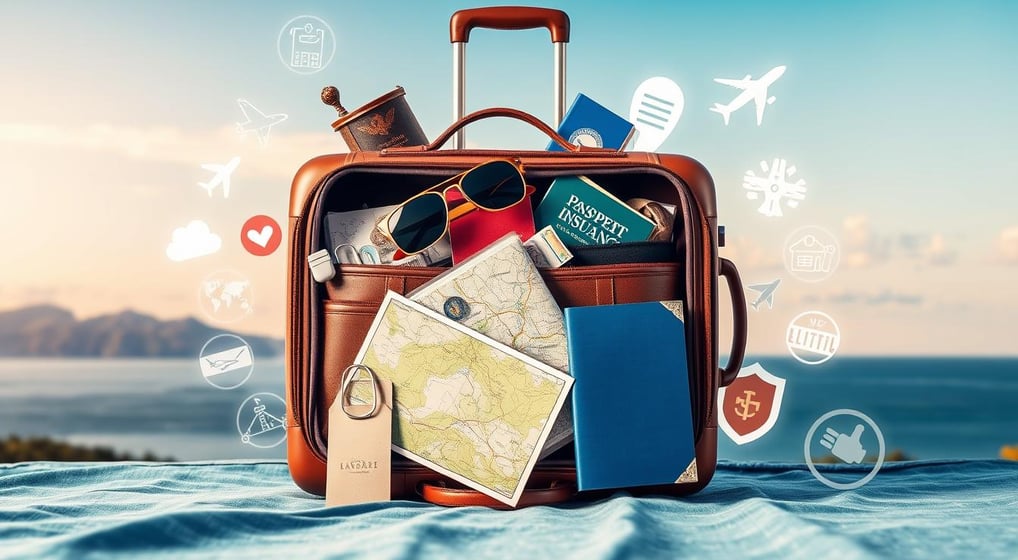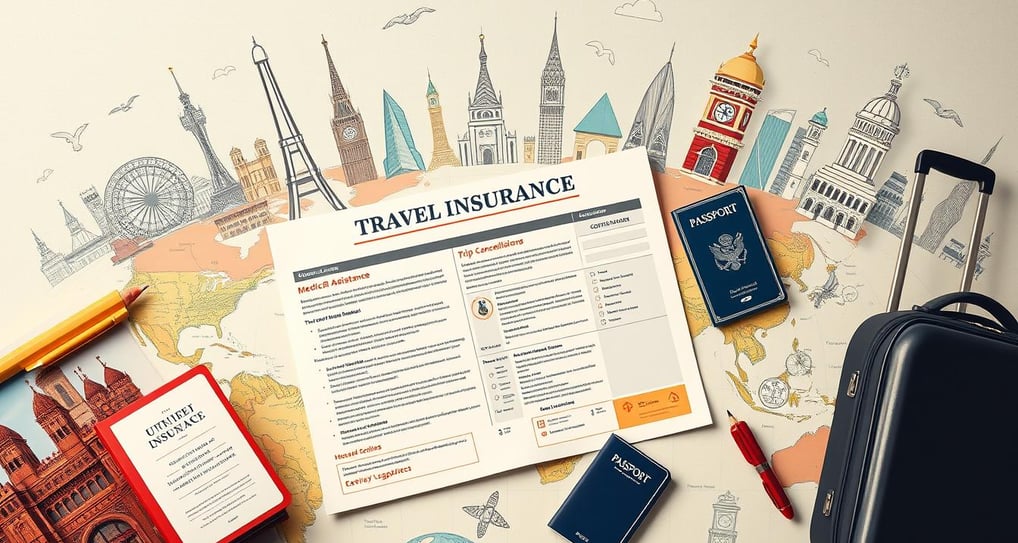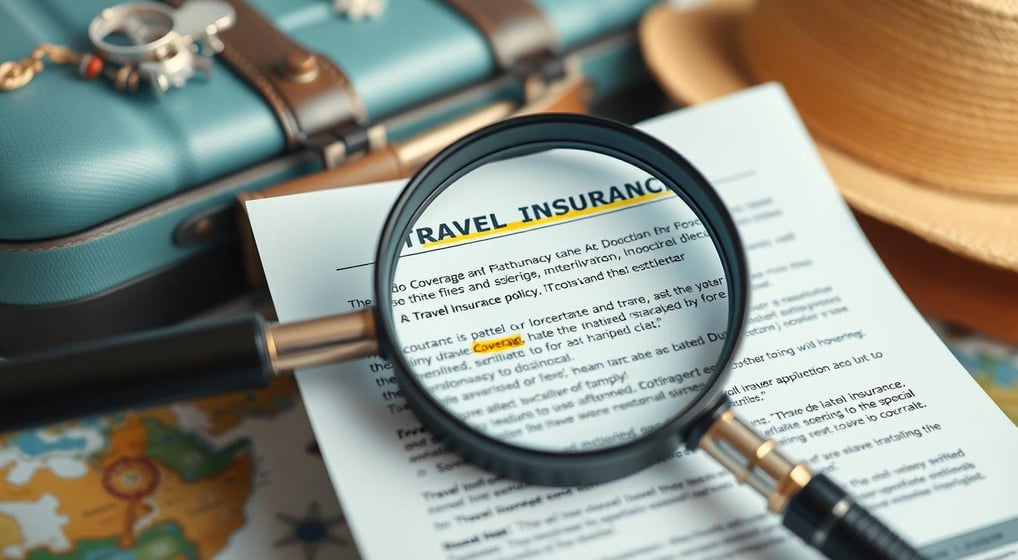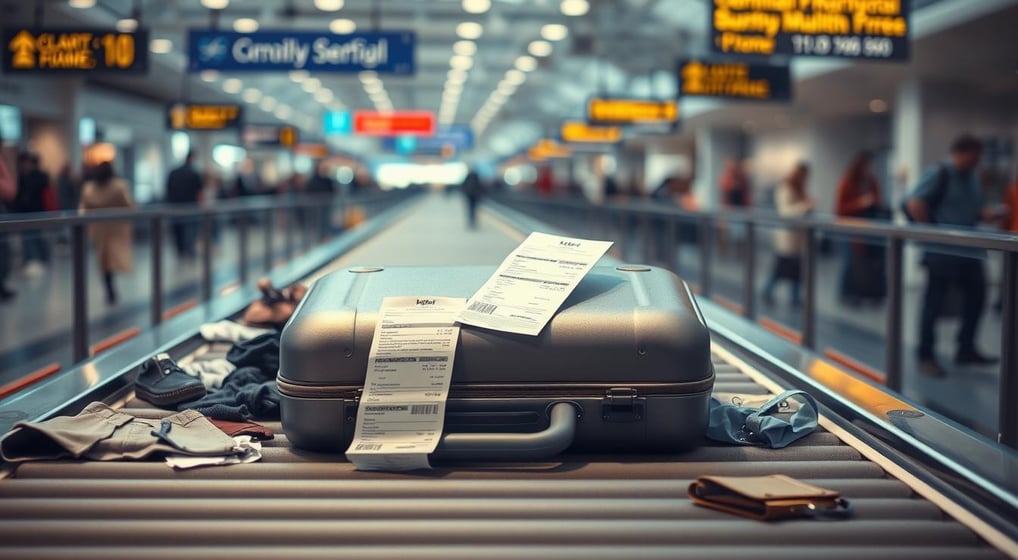Travel Insurance Facts: What to Know Before You Buy
Planning a trip? Discover 10 Important Facts You Should Know Before Buying Travel Insurance to ensure you get the right coverage and protect your travel investment.
Ten Important Facts You Should Know Before Buying Travel Insurance
Traveling can be thrilling, but it also brings unknown risks. Things like medical emergencies or flight cancellations can ruin your trip. That's why travel insurance is crucial, acting as a safety net for your journey.
Before you buy travel insurance, it's key to know the important facts. This knowledge will help you choose the right policy for your needs.


Key Takeaways
Understand the different types of travel insurance coverage and what they entail.
Recognize the importance of travel insurance for protecting your trip investment.
Learn about the common exclusions in travel insurance policies.
Discover how to tailor your coverage to fit your specific travel needs.
Familiarize yourself with the claims process and policy limits.
Understanding Travel Insurance: What Is It?
Travel insurance is a safety net for travelers. It protects against unexpected events and financial losses on trips. It covers many aspects, like trip cancellation, medical emergencies, and lost items.
At its core, travel insurance offers financial help for covered losses. It gives travelers peace of mind, knowing they're ready for the unexpected. Whether it's a domestic trip or an international adventure, it's a valuable investment.
The main types of coverage in travel insurance plans are:
Trip Cancellation and Interruption: This coverage helps if you need to cancel or shorten your trip. Reasons include illness, injury, or natural disasters.
Medical and Emergency Assistance: It covers medical costs, like hospital stays and doctor visits, if you get sick or hurt while traveling.
Baggage and Personal Effects: This protects your luggage and personal items if they're lost, stolen, or damaged during your trip.
Travel Delay and Missed Connection: It helps with extra costs, like meals and lodging, if your trip is delayed. Reasons include flight cancellations or severe weather.
Knowing about travel insurance coverage can help you pick the right policy. It ensures you're protected during your travels.
Why Travel Insurance Is Essential for Travelers
Traveling is exciting and rewarding, but it has risks. That's where travel insurance comes in. It offers a safety net for unexpected events that can ruin your trip. It covers medical emergency assistance and trip interruption benefits, showing its great value.
One key reason for travel insurance is unexpected medical emergencies. A sudden illness or accident can lead to huge medical bills abroad. Travel insurance helps cover these costs, so you can get the care you need without worrying about money.
Travel insurance can cover medical expenses, like hospital stays, doctor visits, and meds.
It can also help arrange transport to the nearest hospital in a medical emergency.
Some policies even offer emergency medical evacuation, crucial in remote areas.
Travel insurance also protects your money if your trip is cut short or canceled. Things like natural disasters, job losses, or family emergencies can force you to cancel. With the right insurance, you can get back some of the money you spent, helping financially.
Travel insurance also covers other unexpected situations, like lost luggage, flight delays, and legal help. This wide range of protection lets you enjoy your trip without worrying about money problems.
In short, travel insurance is a must-have for any traveler. It protects against medical emergencies, trip interruptions, and more. It gives you the financial security and peace of mind to fully enjoy your journey.
Key Components of Travel Insurance Plans
Travel insurance is key for a worry-free trip. It covers many risks, like baggage loss reimbursement and travel delay compensation. These are crucial parts of a good plan.
Baggage loss reimbursement helps if your luggage gets lost, stolen, or damaged. It lets you replace important items and reduces stress. Travel delay compensation covers costs from unexpected delays, like missed flights.
Travel insurance also covers trip cancellations, medical emergencies, and adventure sports. Knowing what your policy includes ensures you're protected for your trip.
Baggage loss reimbursement
Travel delay compensation
Trip cancellation coverage
Medical emergency coverage
Adventure sports coverage
Understanding your travel insurance plan helps you choose the right one. This way, you can enjoy your trip without worries.
Factors to Consider When Choosing a Travel Insurance Provider
Choosing the right travel insurance provider is key to your safety and peace of mind while traveling. When looking at different options, consider these important factors:
Reputation and Financial Stability: Find an insurance provider known for reliability, strong finances, and great customer service. This ensures your claims are handled well and your coverage is honored.
Coverage Options: Check the coverage each provider offers to see if it fits your travel needs. Make sure they have pre-existing condition coverage and a 24/7 travel assistance hotline.
Claim Process Efficiency: Learn how each provider handles claims. Choose ones with easy, quick claim processes and a history of fair resolutions.
Customer Service and Support: Look at how well providers respond before and during your trip. Choose those with 24/7 help and services in many languages.
Policy Flexibility and Customization: Find providers that let you customize your coverage. This way, you can adjust your plan to fit your travel needs and budget.
By thinking about these points, you can pick a travel insurance provider that gives you the coverage, service, and peace of mind you need for your travels.
Common Exclusions in Travel Insurance
Travel insurance has its own set of rules and exclusions. These rules can affect how much you're covered for, especially if you're into adventure sports or have health issues.
One big exclusion is pre-existing medical conditions. Most policies don't cover these unless you buy extra coverage. This is key for people with ongoing health problems.
Pre-existing conditions: Many policies exclude coverage for pre-existing medical conditions, so it's crucial to review the policy details carefully.
Adventure sports activities: Extreme sports, such as bungee jumping, skydiving, or rock climbing, are often excluded from standard travel insurance policies. If you plan to participate in these activities, you may need to purchase a specialized policy or add-on coverage.
Certain destinations: Some travel insurance policies may exclude coverage for specific destinations, especially areas with political unrest, natural disasters, or other high-risk factors.
Knowing about these exclusions helps you choose the right travel insurance. Look at the policy details and think about your plans. This way, you can get coverage that fits your needs.
Understanding Policy Limits and Coverage Amounts
Travel insurance can be tricky to understand. But knowing about policy limits and coverage amounts is key. These figures show the max you can get for claims like medical emergencies or lost items.
When picking a travel insurance plan, look closely at the coverage limits. These limits change based on the provider and plan. For example, medical help might cover up to $100,000 per person. But trip cancellations might only cover up to $5,000 per person.
It's important to pick a policy that fits your travel needs. If you're going on a big trip or doing risky activities, you might need more coverage. But for a simple domestic trip, a less expensive plan might be enough.
Remember, coverage amounts are usually per person, per trip, or per event. Knowing this helps you choose the right travel insurance coverage for your trip.


Also, don't forget to check the policy's deductibles and co-payments. These can change how much you pay out of pocket for claims. By looking at the policy details, you can find a good balance between enough coverage and a good price.
Travel Insurance Premiums: How They Are Determined
Understanding how travel insurance premiums are calculated is key. Several factors can affect the cost, including the type of trip cancellation protection you choose.
The cost of your trip is a major factor. The more expensive your trip, the higher the insurance cost. Insurers take on more risk with pricier trips.
How long you're traveling also matters. Longer trips mean higher premiums. This is because you're covered for a longer time. The destination can also raise costs. Places with higher health or safety risks often have higher premiums.
Your age is another factor. Older travelers might pay more. This is because they're more likely to need medical help or cancel trips due to health issues.
But, there are ways to lower your insurance costs. Buying insurance with other travel items, like flights or hotels, can save money. Choosing a higher deductible or limiting coverage can also cut costs.
Tailoring Coverage to Fit Your Travel Needs
Travel insurance isn't a one-size-fits-all deal. Your needs change based on your trip, activities, and personal situation. It's key to create a plan that fits you perfectly, so you're covered without overpaying.
If you love adventure sports, think about adding coverage for those activities. This includes skiing, rock climbing, or scuba diving. Also, if you have a health condition, find a plan that covers pre-existing conditions. This way, you're fully protected.
Adventure sports activities coverage
Pre-existing condition coverage
Family travel considerations
Business trip requirements
Families with kids might need extra for trip cancellations or interruptions due to a child's health issues. Business travelers might want coverage for delays, lost gear, and liability.
By looking at your trip and personal needs, you can pick the best insurance plan. This tailored approach gives you peace of mind, letting you enjoy your travels fully.
Reading the Fine Print: Important Terms to Know
When you buy travel insurance, it's key to read the policy details carefully. This section will explain some important terms. It will help you make a smart choice and get the right coverage.
Trip interruption benefits are a crucial term. These benefits help if your trip is cut short by unexpected events like illness or family emergencies. Knowing what qualifies for these benefits is important.
Travel delay compensation is another key term. It covers extra costs if your trip is delayed, like food, lodging, or different travel. Knowing what delays are covered and how much you can get back is vital.
Pre-existing medical condition exclusions
Trip cancellation and interruption coverage
Emergency medical and evacuation benefits
Baggage and personal belongings coverage
Policy limits and deductibles
By understanding the fine print, you can be sure your travel insurance protects you. This gives you peace of mind for your next adventure.


When to Purchase Travel Insurance
Timing is key when securing your travel plans. Buying trip cancellation protection and pre-existing condition coverage early offers peace of mind and financial security. Here's when to think about getting travel insurance:
As Soon as You Book Your Trip - The sooner you buy travel insurance, the better. It protects your investment from the start, covering unexpected cancellations or delays.
Within 7-14 Days of Paying for Your Trip - Many insurers offer extra benefits, like waived pre-existing condition exclusions, if you buy within a week or two of your first trip deposit.
At Least 30 Days Before Departure - Buying your travel insurance early gives you time to review the policy and understand its coverage.
Buying travel insurance at the last minute can limit your options and coverage. It's best to get your policy early to maximize benefits and protect your investment.
Remember, when you buy travel insurance affects your coverage and protection. Plan ahead, review your options, and buy your policy as soon as possible for a worry-free trip.
The Role of Travel Insurance in Adventure Sports
Adventure sports are thrilling but come with risks. Travel insurance is crucial for safety. It covers medical emergencies, equipment damage, and more.
Travel insurance offers key benefits for adventure lovers. It provides medical assistance, including emergency care and evacuation. This is vital for injuries or illnesses in remote areas.
It also protects your gear. If your skis or climbing equipment gets damaged, insurance can help. This saves you from financial loss and lets you keep exploring.
Choosing the right travel insurance is important. Look at coverage limits, exclusions, and activity restrictions. This ensures your policy fits your adventure plans.
Getting a good travel insurance policy is smart. It protects your finances and gives you medical help. This way, you can enjoy your adventures without worry.
How to File a Claim for Travel Insurance
Filing a travel insurance claim can seem hard, but it's easier than you think. You might need to claim for lost baggage or get help from a 24/7 hotline. Knowing what to do first is key.
To start, you'll need some important documents:
A copy of your travel insurance policy
Detailed records of the incident, including any police reports or receipts for expenses
Proof of the loss or damage, such as photographs or receipts for replacement items
After you have these documents, contact your insurance provider. Many offer online claims, making it easier. Be ready to tell them about the incident and any costs you've faced.
Don't forget to file your claim on time. Most policies have a deadline. Also, check if there are any limits or things not covered.
By knowing how to file a claim and documenting well, you can get the help you need. This way, your travel insurance will protect you as it should.


Comparing Travel Insurance Policies
When looking at travel insurance, it's key to compare different policies. This ensures you get the right coverage for your needs. Travel insurance can vary a lot, so knowing what makes each policy different is important. One key thing to look at is the trip interruption benefits.
Trip interruption benefits help if your trip is cut short due to illness, injury, or bad weather. The amount of coverage can vary a lot. It's crucial to check the limits and what's not covered in each policy.
Another important thing is the type of coverage offered. Some policies cover more, like medical emergencies, trip delays, lost or stolen bags, and even adventure sports. By comparing what each policy includes and excludes, you can find the best deal.
Evaluate the trip interruption benefits: Compare the coverage limits and the specific circumstances under which you can file a claim.
Consider the overall coverage: Look for policies that offer a wider range of benefits, such as medical emergency assistance, trip delay reimbursement, and lost or stolen baggage coverage.
Assess the policy exclusions: Understand what activities or situations are not covered by the policy, as this can impact the value of the coverage.
Compare deductibles and premiums: Weigh the cost of the policy against the level of coverage to find the best balance for your needs and budget.
By taking the time to compare travel insurance policies, you can find the right coverage for your trip. This includes good travel insurance coverage and valuable trip interruption benefits. It can give you peace of mind and financial protection while traveling.
Conclusion: Making an Informed Decision
This article has given you the tools to make smart choices about travel insurance. You now know what travel insurance plans cover and what they don't. This knowledge helps you pick the right coverage for your trips.
Whether you're going on a big adventure or a relaxing vacation, you're ready. The key points about travel insurance have set you up to choose wisely. Think about the insurance company's reliability and what they offer to protect you.
Travel insurance isn't a one-size-fits-all deal. It's important to customize it for your travel plans and risk level. By reading the details and understanding the terms, you can choose with confidence. This way, you'll have peace of mind and financial security on your travels.
FAQ
What is the purpose of travel insurance?
Travel insurance offers financial protection and peace of mind. It helps with unexpected events like trip cancellations, medical emergencies, and lost or delayed baggage.
What are the main types of travel insurance coverage?
Main types include trip cancellation, interruption, medical emergency assistance, and baggage loss or delay. Travel delay compensation is also covered.
Why is travel insurance essential for travelers?
It protects against financial losses from unexpected events. This includes medical emergencies, flight cancellations, and natural disasters. It covers medical expenses, trip interruption, and more.
What are some common exclusions in travel insurance policies?
Exclusions include pre-existing medical conditions and high-risk sports. Also, travel to unstable regions and certain illnesses or injuries are not covered.
How are travel insurance premiums determined?
Premiums depend on trip cost, traveler's age, destination, and coverage limits. Higher limits or extra benefits mean higher premiums.
When is the best time to purchase travel insurance?
Buy it as soon as you book your trip. This covers cancellations and other pre-departure issues. Some benefits, like pre-existing medical conditions, require early purchase.
How can I ensure my travel insurance policy covers adventure sports activities?
Check your policy or get a specialized one for adventure sports. Some may need an extra premium for this coverage.
What should I do if I need to file a travel insurance claim?
You'll need to provide receipts, medical records, and incident proof. Follow your provider's claims process and submit on time.
How can I compare different travel insurance policies?
Look at coverage limits, deductibles, and exclusions. Also, consider the provider's reputation, customer service, and claims process.